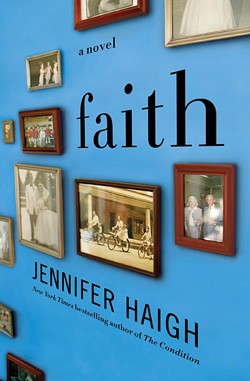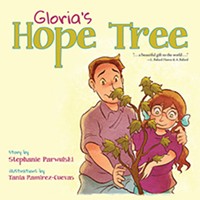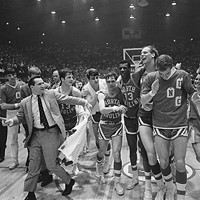Book reviews: Jennifer Haigh's Faith
Faith by Jennifer Haigh (Harper, 336 pages, $25.99).
"Oh, great," I thought when first picking up novelist Jennifer Haigh's latest, Faith. "Another book about sex abuse in the Catholic Church." My Disgust-ometer was maxed out years ago by the horrendous scandal, and the last thing I felt like doing was rehashing the whole mess by way of a 300-page novel. What new things could be said, after all, what new insights offered, into Catholicism's repugnant Diddling Priests controversy? Nothing much, I thought. Boy, was I wrong.
Haigh's tale takes place largely in Boston during the 2002 Boston Archdiocese scandals, but it's a far cry from the sensational news stories the country consumed in those days. She steers clear of the angry manifesto mode one might expect — although she does make Church leaders' careless arrogance crystal clear — and involves us instead in the lives of an Irish Catholic family in Boston. That family includes Sheila McGann, the primary narrator, and half-sister of 50-something Art Breen — make that Father Art Breen — who has served the archdiocese for a quarter century.
On Good Friday, 2002, in the middle of the pedophile abuse scandals in Boston, Fr. Art is suddenly called into the office of a church administrator. There, the official blithely tells him he's being placed on administrative leave, that he may not speak to anyone about his situation, and, oh yeah, he has to move out of the rectory where he has lived for years. Even worse, like a gray, bureaucratic figure out of Kafka, the administrator won't tell Fr. Art who is accusing him, or even what he's being accused of.
As the priest is moved to an apartment, the news hits that he's been accused of sexual abuse of an 8-year-old boy. Sheila flies home to Boston as soon as she can, ready to defend her brother. From there, however, Faith takes one unpredictable, though believable, turn after another. Sheila's family and their reactions to the accusations against Fr. Art become the focus of the story. Haigh weaves together Sheila's memories of growing up in a strong Catholic family in Boston (she has since left the church) with her own attempts to objectively figure out what's going on. Art was the only child of his mother's first marriage. Sheila and her brother, Mike, were fathered by their mother's second husband, Ted, an angry drinker who remained aloof to Art before the future priest headed off to seminary.
Sheila sees Art as a grown, intelligent man who is nonetheless also a half-child who left home scared and lonely. For Art, the Church's structure, guidelines and vows have been both a source of security and a buffer against the complications of adulthood, but Sheila wonders how much damage Art suffered from his father's death and the coldness of his new stepfather, and whether they may have anything to do with the new explosive charges.
Aidan, the boy whom Fr. Art is accused of molesting, is the son of his housekeeper's daughter. He takes Aidan under his wing, and grows emotionally attached to the boy. Then the accusations come. Sheila initially has great faith in her brother's innocence, reflecting her mother's strident denials that Art would be capable of such a horror. Sheila suspects that Aidan's mother, Kath, drug-addicted and dependent on her equally addled boyfriend, made the accusations at the boyfriend's suggestion in order to get quick money from the church.
Sheila's brother Mike isn't sure what he thinks about the charges against his older stepbrother. It doesn't simplify things that Mike's wife despises the Catholic Church. Mike is driven to find the truth, "one way or the other," about Art, but the search throws him off balance and he takes terrible risks that undermine the family's faith in itself, and its members' faith in each other. As more details emerge about the "Fr. Art case," that faith is strained to the breaking point.
Haigh's writing is simply amazing, eliciting the shades of gray imbedded in her story with subtle characterizations and short, sharp observations; and also delivering the sledgehammer blows needed to remind us that notwithstanding the gray moral shades of life, some values are compromised, or shaded, at the risk of our humanity. She creates two simultaneous senses of suspense: over Fr. Art's guilt or innocence, and a moral suspense about the family's past history and its future. Haigh's prose is tight and easy, but she delivers a sense of mystery, and even awe, at life's, and families', complexity that belies how effortless her novel is to read.
Latest in Books
Calendar
-

NEW WINDOW GALLERY-Pat Rhea-ACRYLIC PAINTINGS-April 05-30 2024 VALDESE, NC 28690 @ New Window Gallery/Play It Again Records
- Through April 30, 12 p.m.
-
Derek Hough - Symphony Of Dance @ Ovens Auditorium
-

"Blood Residue Analysis of Paleoamerican Stone Tools in the Carolinas" @ Native American Studies Center
- Fri., April 26, 12-1 p.m.
-

ARTS RENAISSANCE, a GALA supporting the ARTS in South Carolina @ the Columbia Museum of ART
-
 The Piano Guys @ Ovens Auditorium
The Piano Guys @ Ovens Auditorium











